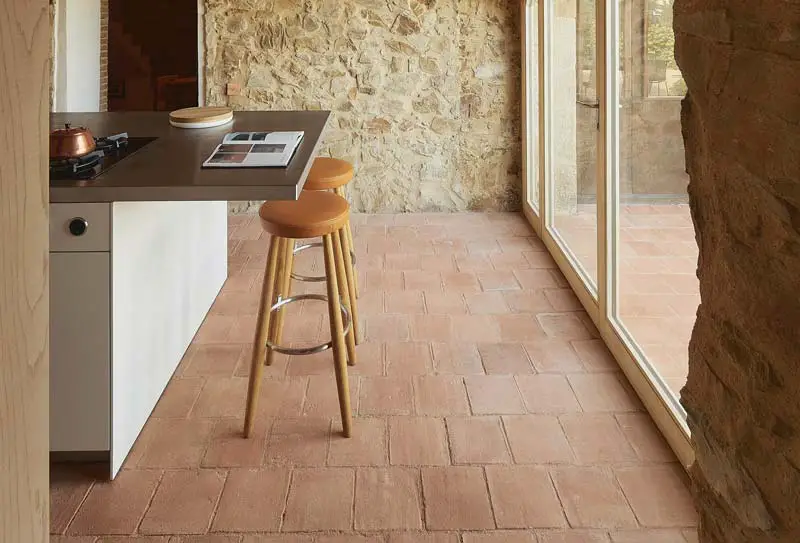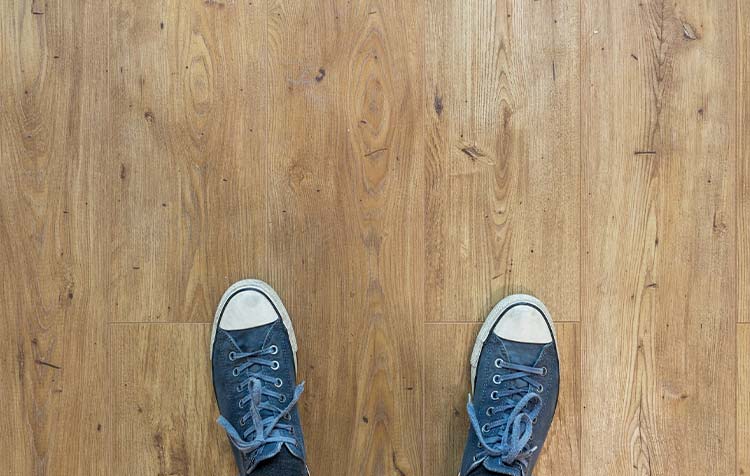Looking for sustainable floors? Then you've come to the right place! You probably want to change the flooring in your apartment soon. Or maybe you're building a house and just want to do everything right from the start. Either way, it's great that you're pursuing the mindset so live as environmentally friendly as possible.
In this article, I'd like to introduce you to the healthiest, most sustainable flooring options and show you exactly what to look for when evaluating the sustainability of flooring. Let's go!
Here is in advance a small Overview about the contribution:
8 healthy and sustainable floors
We certainly agree: the most sustainable floor is certainly the one you don't buy. In the sense of the Zero Waste Lifestyle you should first polish and maintain what you have before thinking about buying a new one.
A new purchase is inevitable? Before you decide on a flooring material, you should first think about what requirements your future floor must meet. For example, does it have to be water-repellent or particularly quiet? And what color should it be? Regardless of which flooring you end up with, nothing is less sustainable than having to change it again after just a few months.
In the end, however, a truly ecological floor depends on other factors. I would like to list these briefly here:
- Durability
- Care
- Lifetime
- Indoor air quality
- Renewability
- Investment and utilization costs
- Energy input during production
- Disposal
I would now like to use these factors to introduce you to the promised sustainable floor coverings. Finally, just use the knowledge to make the final decision a little easier.
1. tiles
German brand tiles are generally manufactured from domestic, natural raw materials under the strictest environmental protection conditions. Modern firing technology, short transport routes and the processing of natural, regional raw materials such as clay and feldspar ensure that the production process is as sustainable as possible. Since it is durable natural material tiles do not contain harmful substances and are extremely durable. They are also recyclable, heat resistant and very easy to clean. Tiles are therefore among the most sustainable floor coverings on the market.
2. wood
Timeless solid wood flooring can usually withstand the demands of several generations and is relatively unproblematic to overhaul. Since the popular flooring made of wood for Deforestation you should always take a close look at possible seals. The international FSC seal The "sustainable wood" seal is awarded to wood from sustainable forestry. If the floor of your desire has this seal, that is already an important step.
Also make sure that in the production of the floor instead of formaldehyde resins prefer more environmentally friendly Dispersion glues or vegetable glues can be used. In addition, more environmentally friendly than sealing with varnishes is oiling the wood with hard oil.
Tip: The very fast-growing bamboo wood can also be considered as a sustainable floor. If it does not have long transport routes from Asian countries behind it, the robust and easy-care flooring material is basically ideal.
3. concrete floor

Since I like the industrial style and try to live as minimalist as possible, I am of course absolutely thrilled with a polished concrete floor. Not only because of the look, but also because of the sustainability. Even though it takes a lot of energy to produce, it stands out for its extreme sturdiness and durability. In addition, he is already cool in the summer months and pleasantly warm in winter - which in turn saves energy costs for heating and air conditioning. The sustainable flooring also does not contain any harmful substances.
You like the industrial style too? Then be sure to check out my homemade dining table from old oak planks on!
4. vinyl
Vinyl floors may not yet have the best reputation, because they used to be not without plasticizers. But the EU requirements are now extremely strict and the floors are not made exclusively from plastics. Even if you always have to look a little closer, there are now many PVC free design floors, which bring with them an extremely long durability. In addition, they are versatile in their appearance: whether country house look, plank look or tile look - basically everything is possible.
And how to care for a Vinyl flooring? The care is in the end absolutely uncomplicated and possible without chemical cleaners. Whether a vinyl floor is sustainable or not can also be determined by the philosophy of the respective supplier. A pioneer in terms of sustainable flooring materials is there in any case the company casandoThe company is committed to ensuring that not only flooring, but also fencing, wall cladding and building materials are as low as possible, ecological footprint respects.
5. natural stone

Even though natural stone is a finite material, it is fundamentally one of the most sustainable floor coverings due to its timeless, water-repellent and extremely robust properties. How sustainable depends in the end on its Production and of course From the stone itself off. Sandstone from the region, for example, would accordingly be more environmentally friendly than granite stone shipped to Germany by sea.
6. cork
Cork is a great soil material and fortunately too 100 percent biodegradable. Anyone who walks along it will quickly feel that as a floor it is extremely soft, warm and wonderfully quiet. However, cork as a floor covering is also particularly environmentally friendly because it is recyclable is. The fact that the cork flooring is hypoallergenic compared to the carpets, contributes to the better health of the home.
7. linoleum
In the past, I always thought that floors made of durable Linoleum are made from artificial ingredients. But today I know that linoleum is exclusively from natural products such as jute, resins, chalk and linseed oils consists. The latter even gave the flooring its name. But it also serves as a sustainable floor because it often survives many generations and is extremely easy to clean. Linoleum is also one of the healthy floor coverings, which are very hygienic and ideal for allergy sufferers.
8. textiles

Carpeting can be sustainable especially when it is made from renewable, natural raw materials. This is the case, for example, with carpets made from Sisal, jute, coconut fibers or Hemp the case. However, the sustainability of floors made of textiles can suffer from the rather short service life compared to wood or tiles and due to the high maintenance requirements.
When buying new, be sure to look for the GUT seal (Gemeinschaft umweltfreundlicher Teppichboden e. V.), which contributes significantly to ecological improvements in the production of carpets and to their better health compatibility.
Natural, Sustainable Flooring - For Health and Environment!
Now you've learned about some eco-friendly flooring materials to consider for your construction or remodeling project. Remember, however, that the Sustainability depends not only on the material itself, but also on the way you handle it.. In the case of heavily used surfaces, for example, it makes sense to cover the "walkways" with carpet runners. It is also recommended to install sliding pads under heavy furniture. In this way, you protect the floor and benefit from a significantly longer service life.
Do you have any questions about this post on ecological flooring? Then I look forward to your comment!
Stay sustainable,

PS: An ecological, durable floor is an important step in a more sustainable life. Learn in the article about the Reduction of your ecological footprintwhat else you can do!






